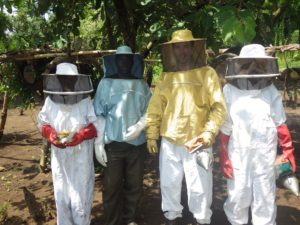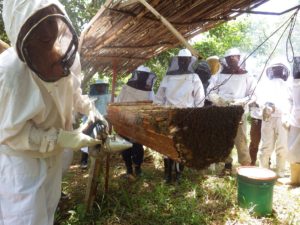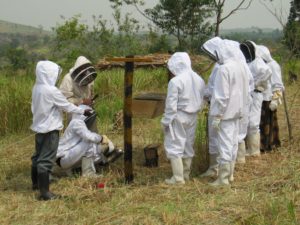A social enterprise based in Uganda, Malaika Honey is taking beekeeping to a whole new level. Since June 2006, they’ve been focused on training marginalized farmers on how to be proficient beekeepers and providing them with the necessary equipment and tools to succeed. They also make every effort to provide a reliable market for the beekeeper’s honey and hive products. It all comes down to a dedication to developing a long-term, self-sustainable world market for Ugandan honey and hive products.
The ultimate hope is to help farmers grow from their subsistence beekeeping culture to small-mid income earners using modern techniques in beekeeping. Over the years, Malaika Honey has developed a strong track record of providing farmers with practical knowledge and skills, raising their income levels in the process.
The success so far is compelling. For example, their honey label “Not tonight honey” is today a leading brand and their approach of buying high and selling low has allowed them to stimulate production at the farmer level. Among their other achievements, Malaika has pioneered the market for secondary beehive products, namely propolis, which is produced by bees and has significant antibiotic properties.
Using top-notch beehive technology and with a great understanding for the traditional skills currently used, Malaika is able to instruct farmers on the methods needed to venture forward. In that way, they represent a new approach to development in the industry. Farmers are given classes with interactive training modules and digital presentations, provided with apiary skills and challenging tasks set to stimulate performance.
What’s more, Malaika Honey’s beekeeping equipment is affordable for the small-scale farmer. And they’ve designed beehives, bee suits, hive tools, and more recently a bee venom collection machine, which is the first of its kind in Uganda. Also involved in research and development of efficient methods and beekeeping equipment, the organization partnered with Designers without Borders to develop a KTB hive tool and modernized beehive. They’ve produced a technical information portal with information sheets and videos and published a practical guidebook Beekeeping as a Business, now in its second edition, documenting over ten years of acquired knowledge locally and internationally.
Their greatest success, however, has been to drive development with reliable markets. Toward this end, they’ve developed the Honey outreach model which has been a great success in reaching and bringing markets direct to farmers and establishing centres for skill development.
Malaika Honey has proven themselves strong innovators too, with “necessity is the mother of invention” their inspiration. Case in point: they built a ‘bee fence’ to ward off elephants, known to have a devastating impact on farmers’ livelihoods, when other methods for keeping them away were proving futile. The fence, containing bee hives (which elephants dislike), is a perfect solution to protect the crops while leaving the elephants unharmed. The fence has since received international attention and praise in both the local and global media. This is indicative of the spirit of inventiveness that drives Malaika forwards today and into their future.
Taking about their future, Malaika is currently seeking funding for a honey resource centre via the crowdfunding platform Indiegogo. This will act as a permanent place where they can train and equip farmers to help them go from just scraping by to providing their families with a regular income.



